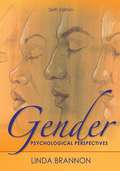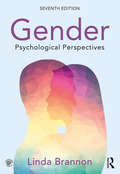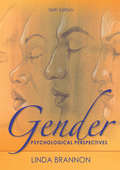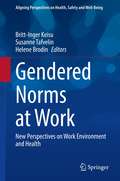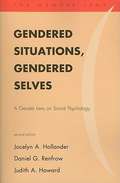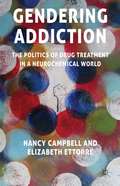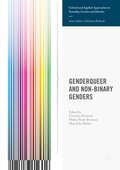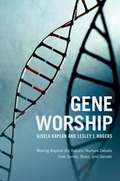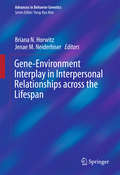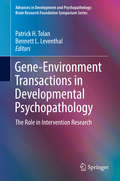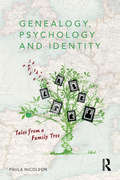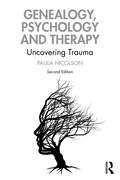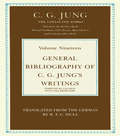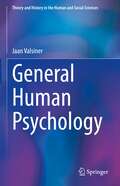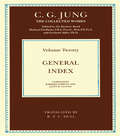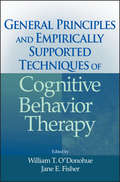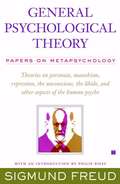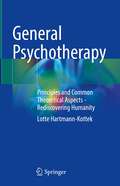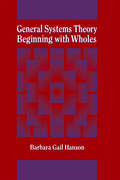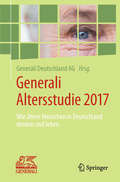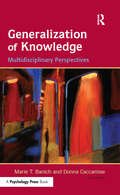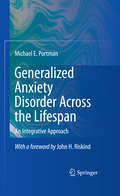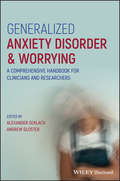- Table View
- List View
Gender: Psychological Perspectives (6th Edition)
by Linda BrannonThis book examines the topic of gender--the behaviors and attitudes that relate to (but are not entirely congruent with) biological sex.
Gender: Psychological Perspectives, Seventh Edition
by Linda BrannonGender: Psychological Perspectives synthesizes the latest research on gender to help students think critically about the differences between research findings and stereotypes, provoking them to examine and revise their own preconceptions. The text examines the behavioral, biological, and social context in which women and men express gendered behaviors. The text’s unique pedagogical program helps students understand the portrayal of gender in the media and the application of gender research in the real world. Headlines from the news open each chapter to engage the reader. Gendered Voices present true personal accounts of people's lives. According to the Media boxes highlight gender-related coverage in newspapers, magazines, books, TV, and movies, while According to the Research boxes offer the latest scientifically based research to help students analyze the accuracy and fairness of gender images presented in the media. Additionally, Considering Diversity sections emphasize the cross-cultural perspective of gender. This text is intended for undergraduate or graduate courses on the psychology of gender, psychology of sex, psychology of women or men, gender issues, sex roles, women in society, and women’s or men’s studies. It is also applicable to sociology and anthropology courses on diversity. Seventh Edition Highlights: 12 new headlines on topics ranging from gender and the Flynn effect to gender stereotyping that affects men Coverage of gender issues in aging adults and transgendered individuals Expanded coverage of diversity issues in the US and around the globe, including the latest research from China, Japan, and Europe More tables, figures, and photos to provide summaries of text in an easy-to-absorb format End-of-chapter summaries and glossary Suggested readings for further exploration of chapter topics Companion website at www.routledge.com/cw/Brannon containing both instructor and student resources
Gender: Psychological Perspectives, Sixth Edition
by Linda BrannonThis bestselling text presents research about gender and helps students think critically about the differences between research findings and gender stereotypes. It examines the biology and social context in which women and men express gendered behaviors. Defining gender as the behaviors and attitudes that relate to (but are not entirely congruent with) biological sex, the book focuses on research and scholarship to provide the material for a critical review and an overall picture of gender from a psychological perspective. To highlight how research findings can relate to people's lives, the book supplements the review of scholarly research with personal, narrative accounts of gender-relevant aspects of people's lives. To emphasize the cross-cultural perspective of gender, the book including a section on diversity in most chapters but also weaves diversity issues throughout the text. The personal narrative and diversity highlights help to balance the research-based scholarship with the personal experience of gender.
Gendered Norms at Work: New Perspectives on Work Environment and Health (Aligning Perspectives on Health, Safety and Well-Being)
by Britt-Inger Keisu Susanne Tafvelin Helene BrodinThis edited volume discusses how deeply entrenched gender norms in work environments, even in welfare economies, can affect women’s health in an adverse way. The volume provides a broad overview of contributing factors. It derives specific answers from case studies in Sweden, a welfare state where women’s labour market participation is very high, but where horizontal and vertical gender segregation in work is also one of the highest in the world. Women tend to work in occupations that are heavily dominated by women. An issue in women-dominated occupations is a considerably higher sickness absence than men, with the highest rates being in human service and care occupations. This volume adds to the literature on health and wellbeing in women-dominated professions and workplaces through studying the work environment, organizational changes, digitalization, threats, violence and conflict, and work conditions that could contribute to healthier workplaces for women. In addition, it points to the need for deeper gender analysis in work norms, and using both quantitative and qualitative approaches. It is of interest to social and behavioural scientists studying work, gender and health, as well as HR professionals and policy makers.
Gendered Situations, Gendered Selves: A Gender Lens on Social Psychology (Second Edition)
by Judith A. Howard Jocelyn A. Hollander Daniel G. RenfrowThe book examines the basic underpinnings of everyday interaction: from how we think, to who we see ourselves and others to be, to how we interact with others. Each of these processes is based on both social psychology and gender (as differentiated from sex), as well as our racial backgrounds, ethnic heritages, socioeconomic circumstances, sexualities, and national histories. The authors present and critique each of the major theories of social psychology, social exchange, social cognition, and symbolic interaction. In doing so, the book introduces a full array of key concepts in social psychology—perception, stereotyping, attribution, self-presentation, impression management, defining social situations, exchanging resources, and balancing power and dependence in social relations. The book also discusses two fundamental aspects of human behavior—the dynamics of helping and harming. The second edition incorporates discussions of contemporary psychological and sociological research and features powerful new examples, including 9/11 and the election of Barack Obama.
Gendering Addiction
by Nancy D. Campbell Elizabeth EttorreThis study, by two leading scholars in the field, draws on feminist theory and science and technology studies to uncover a basic injustice for the human rights of drug-using women: most women who need drug treatment in the US and UK do not get it. Why not?
Genderqueer and Non-Binary Genders
by Christina Richards Meg-John Barker Walter Pierre BoumanThis book addresses the emerging field of genderqueer or non-binary genders - that is, individuals who do not identify as male or female. It considers theoretical, research, practice, and activist perspectives; and outlines a basis for good practice when working with non-binary individuals. The first section provides an overview of historical, legal and academic aspects of this phenomenon. The second section explores how psychotherapeutic, psychological and psychiatric theory and practice are adapting to a non-binary model of gender, and the third section considers the body related aspects, from endocrinology to surgery. This work will appeal to a wide readership, from practitioners working with non-binary individuals - including psychologists, surgeons, social workers, nurses, psychiatrists, endocrinologists, psychotherapists and counselors, lawyers, and healthcare workers - to researchers interested in the study of gender identities, to students and gender activists.
Gene Worship: Moving Beyond the Nature/Nurture Debate over Genes, Brain, and Gender
by Gisela Kaplan Lesley J. RogersPLANGISE|GENEWORSHIPMOVI
Gene-Environment Interactions in Developmental Psychopathology
by Michael Rutter Kenneth DodgeBringing together foremost experts, this book reviews groundbreaking gene-environment research and explores implications for clinical practice, prevention, and public policy. Presented is cutting-edge work on the interplay of genetic factors and childhood experiences in the development of mental disorders such as depression, conduct disorder, and schizophrenia. Essential topics include what scientists currently know about "susceptibility genes"; the mechanisms by which maltreatment and other stressors interact with biological susceptibilities across development; and factors that make certain children more resilient than others. Future directions for personalizing treatment and prevention efforts, thus making them more effective, are discussed.
Gene-Environment Interplay in Interpersonal Relationships across the Lifespan
by Briana N. Horwitz Jenae M. NeiderhiserIntriguing new findings on how genes and environments work together through different stages of life take the spotlight in this significant collection. Studies from infancy to late adulthood show both forces as shaping individuals' relationships within family and non-family contexts, and examine how these relationships, in turn, continue to shape the individual. Transitional periods, in which individuals become more autonomous and relationships and personal identities become more complicated, receive special emphasis. In addition, chapters shed light on the extent to which the quantity and quality of genetic and environmental influence may shift across and even within life stages. Included in the coverage: Gene-environment interplay in parenting young children. The sibling relationship as a source of shared environment. Gene-environment transactions in childhood and adolescent problematic peer relationships. Toward a developmentally sensitive and genetically informed perspective on popularity. Spouse, parent, and co-worker: roles and relationships in adulthood. The family system as a unit of clinical care: the role of genetic systems. Behavioral geneticists, clinical psychologists, and family therapists will find in Gene-Environment Interplay in Interpersonal Relationships across the Lifespan a window into current thinking on the subject, new perspectives for understanding clients and cases, and ideas for further study.
Gene-Environment Transactions in Developmental Psychopathology
by Patrick H. Tolan Bennett L. LeventhalThis book examines the current research in gene-environment transactions (GEX) and its potential use in developing interventions and applications tailored to individual genetic makeups. Key concepts underlying GEX studies in this area are defined, identifying fundamental challenges in devising informed research questions and conducting valid and useful experiments. Chapters analyze GEX models inspired by the present day genome-based frameworks, particularly in terms of advances in identifying and understanding complex environmental factors, using examples from common psychological conditions, such as antisocial behavior, chronic physical aggression, and chronic internalizing disorder. In addition, the book presents new and potential applications of the framework in the contexts of prevention science and intervention research. Topics featured in this book include: Epigenetics and the biology of gene x environment interactions. Gene by environment interactions and its potential use for intervention strategies in anxiety disorders. The challenges and potential for research on gene-environment interactions within autism spectrum disorder. Using genetically informed prevention trials to test gene x environment hypothese. Challenges for intervention research within the GEX framework. Gene-Environment Transactions in Developmental Psychopathology is a must-have resource for researchers/professors, clinicians, and related professionals as well as graduate students in developmental psychology, psychiatry, human genetics, and related disciplines.
Genealogy, Psychology and Identity: Tales from a family tree
by Paula NicolsonThe popularity of amateur genealogy and family history has soared in recent times. Genealogy, Psychology and Identity explores this popular international pastime and offers reasons why it informs our sense of who we are, and our place in both contemporary culture and historical context. We will never know any of the people we discover from our histories in person, but for several reasons we recognize that their lives shaped ours. Paula Nicolson draws on her experiences tracing her own family history to show how people can connect with archival material, using documents and texts to expand their knowledge and understanding of the psychosocial experiences of their ancestors. Key approaches to identity and relationships lend clues to our own lives but also to what psychosocial factors run across generations. Attachment and abandonment, trusting, being let down, becoming independent, migration, health and money, all resonate with the psychological experiences that define the outlooks, personalities and the ways that those who came before us related to others. Nicolson highlights the importance of genealogy in the development of identity and the therapeutic potential of family history in cultivating well-being that will be of interest to those researching their own family tree, genealogists and counsellors, as well as students and researchers in social psychology and social history.
Genealogy, Psychology and Therapy: Uncovering Trauma
by Paula NicolsonFully revised and updated, Genealogy, Psychology and Therapy highlights the importance of genealogy in the development of identity, and the therapeutic potential of family history in cultivating wellbeing. The popularity of amateur genealogy and family history has soared in recent times. We will never know any of the people we discover from our histories in person, but for several reasons, we recognize that their lives shaped ours. Key approaches to identity and relationships lend clues to our own lives but also to what psychosocial factors run across generations. Attachment and abandonment, trusting, being let down, becoming independent, migration, health and money, all resonate with the psychological experiences that define the outlooks, personalities and the ways that those who came before us related to others. This new edition builds on the original book, Genealogy, Psychology, and Identity, by highlighting the work of Erik Erikson along with studies of the quality of attachment, historical social conditions especially war, forced migration, health inequalities and financial uncertainty, to enable a more detailed understanding of trauma and its long shadow, and to focus on how genealogy informs our identities and emotional health status, exploring the transmission of trauma across generations. The intergenerational transmission of trauma is examined using analysis of real-life family examples, alongside an assessment of a narrative therapy approach to healing. The book expands on how psychological practices together with genealogical evidence may impart resilience and emotional repair, and develops the discussion of the psychological methods by which we interconnect in a reflective way with material from archival databases, family stories and photographs and other sources including DNA. Showing how people can connect with archival material, using documents and texts to expand their knowledge and understanding of the psychosocial experiences of their ancestors, this book will be of interest to those researching their own family tree, genealogists and counsellors, as well as students and researchers in social psychology and social history.
General Bibliography of C.G. Jung's Writings (Collected Works of C. G. Jung)
by C.G. JungThis bibliography records the initial publication of each original work by C.G. Jung, each translation, and significant revisions and expansions of both, up to 1975. In nearly every case, the compilers have examined the publications in German, French and English. Translations are recorded in Danish, Dutch, English, Finnish, French, Greek Hebrew, Hungarian, Italian, Japanese, Norwegian, Portuguese, Russian, Serbo-Croatian, Slovenian, Spanish, Swedish and Turkish. It is arranged according to language, with German and English first, publications being listed chronologically in each language. The General Bibliography lists the contents of the respective volumes of the Collected Works (of which this is Volume 19) and the Gesammelte Werke, published in Switzerland, and shows the interrelation of the two editions. It also lists Jung's seminars and provides, where possible, information about the origin of works that were first conceived as lectures. An index is provided of all the titles in English and German, and all original works in the other languages. Three specialist indexes, of personal names, organizations and societies and periodicals, complete the work. The publication of the General Bibliography, together with the General Index (Volume 20 of the Collected Works), complete the publication of the Collected Works of C.G. Jung in English.
General Human Psychology (Theory and History in the Human and Social Sciences)
by Jaan ValsinerThe book includes a new theoretical synthesis of William Stern’s classic personology published in the 1930s with contemporary cultural psychology of semiotic mediation developed by the author over the last two decades. It looks at the human mind as it operates in its full complexity, starting from the most complex general levels of aesthetic and political participation in society and ending with individual willful actions in everyday life contexts.
General Index (Collected Works of C.G. Jung)
by C.G. JungThis volume is the general index to the eighteen published textual volumes in the Collected Works of C.G. Jung. The comprehensive indexing goes beyond the volume indexes, and includes sub-indexes to important general topics, such as Alchemical Collections, Codices and Manuscripts, Feud and Numbers, the sub-indexing for the Bible arranged by book, chapter and verse. The General Index, with the General Bibliography of C.G. Jung's Writings (Volume 19 of the Collected Works), together complete the publication of the Collected Works of C.G. Jung in English.
General Principles and Empirically Supported Techniques of Cognitive Behavior Therapy
by William T. Fisher Jane E. O'DonohueProven and effective, cognitive-behavior therapy is the most widely taught psychotherapeutic technique. General Principles and Empirically Supported Techniques of Cognitive Behavior Therapy provides students with a complete introduction to CBT. It includes over 60 chapters on individual therapies for a wide range of presenting problems, such as smoking cessation, stress management, and classroom management. Each chapter contains a table clearly explaining the steps of implementing each therapy. Written for graduate psychology students, it includes new chapters on imaginal exposure and techniques for treating the seriously mentally ill.
General Psychological Theory: Papers on Metapsychology
by Sigmund FreudIn fifteen essays, Sigmund Freud explains his most controversial theories exposing the darkest corners of the human psyche. Best known for his research into the unconscious mind, Sigmund Freud challenged the mores of conventional American society during the early twentieth century. This collection presents many of Freud's revolutionary ideas, showing how his theories changed the way people think about their emotions and actions, opening a rich dialogue about the methods and science of the brain. In a series of essays written between 1911 and 1938, readers follow Freud through clear explanations of how neurology and psychology influence our actions and govern personality traits and emotions, including the libido, narcissism, mourning, repression, dreams, paranoia, and melancholy. This volume illustrates how Freud was not afraid to venture into unknown areas of the human mind and that he was superbly equipped to expose its secrets. Exploring the hypotheses of the most controversial psychologist of the twentieth century, in his own words, may help us understand our own behaviors.
General Psychotherapy: Principles and Common Theoretical Aspects - Rediscovering Humanity
by Lotte Hartmann-KottekThis book highlights common similarities between the various schools of psychotherapy. It provides psychotherapists with the underlying neurophysiological, developmental psychological and relationship-oriented matrix (basic needs and their regulation, deficits, trauma and conflict processing patterns, including accompanying exercises) as well as opportunities for healing correction and stabilisation - and the ways in which to apply these methods in a therapeutically mindful way for the benefit of the patient. The new university-based psychotherapy training covers the four fundamental schools of psychotherapy, i.e. the previous standard approaches plus the systemic and humanistic ones. Focusing on the common ground builds bridges of understanding and encourages collaboration. This expanded, new range of methods to access patients constitutes a substantial development in the field of psychotherapy and will also influence the psychotherapy practice of experienced colleagues. Written for medical and psychological psychotherapists, psychosomatic doctors, psychiatrists and other specialists with additional psychotherapeutic qualifications, and for students of psychotherapy.
General Systems Theory - Beginning With Wholes: Beginning with Wholes
by Barbara G. HansonFirst published in 1995. Routledge is an imprint of Taylor & Francis, an informa company.
Generali Altersstudie 2017: Wie ältere Menschen in Deutschland denken und leben
by Martin LayWie ticken alte Menschen wirklich? Wer wissen will, wie die 65- bis 85-jährigen heute leben und welche Einstellungen sie prägen, bekommt hier fundierte und leicht verständliche Antworten.Die Diskussion über eine älter werdende Gesellschaft braucht klare Fakten. Die Generali Altersstudie liefert die umfassendste empirische Untersuchung zur Lebenssituation und den Perspektiven der Menschen zwischen 65 und 85 Jahren in Deutschland. Viele der repräsentativen Antworten der über 4.000 Befragten verblüffen und räumen mit vielen Vorurteilen über das Alter auf.Im Auftrag der Generali Deutschland AG hat das renommierte Institut für Demoskopie Allensbach diese Untersuchung nach 2013 zum zweiten Mal durchgeführt. Verständlich kommentiert werden die Ergebnisse von den namhaftesten deutschen Altersforschern. Diese anschauliche, gut illustrierte Studie, unterhaltsam und lehrreich aufbereitet als Sachbuch, wird für viele ein Augenöffner sein und die politische und gesellschaftliche Diskussion über die Teilhabe der Alten vorantreiben.
Generalization of Knowledge: Multidisciplinary Perspectives
by Marie T. BanichWhile the notion of generalization fits prominently into cognitive theories of learning, there is surprisingly little research literature that takes an overview of the issue from a broad multifaceted perspective. This volume remedies this by taking a multidisciplinary perspective on generalization of knowledge from several fields associated with Cognitive Science, including Cognitive Neuroscience, Computer Science, Education, Linguistics, Developmental Science, and Speech, Language and Hearing Sciences. Researchers from each perspective explain how their field defines generalization - and what practices, representations, processes, and systems in their field support generalization. They also examine when generalization is detrimental or not needed. A principal aim is the identification of general principles about generalization that can be derived from triangulation across different disciplines and approaches. Collectively, the contributors’ multidisciplinary approaches to generalization provide new insights into this concept that will, in turn, inform future research into theory and application, including tutoring, assistive technology, and endeavors involving collaboration and distributed cognition.
Generalized Anxiety Disorder Across the Lifespan
by Michael E. PortmanGeneralized anxiety disorder is a chronic, disabling, often lifelong condition affecting millions worldwide. Yet, despite its prevalence, GAD is frequently marginalized, misdiagnosed, and undertreated. Generalized Anxiety Disorder Across the Lifespan creates a practical knowledge base for GAD, identifying the symptoms that set it apart both from "normal, everyday" anxiety and from other anxiety-based pathologies, and thoroughly reviewing the range of established and cutting-edge treatments. The author's developmental approach sheds some light on longstanding clinical mysteries surrounding the disorder, among them the interplay of somatic and psychological symptoms and the changes in symptoms as patients age. Accessible to the novice or the veteran reader, the book: Grounds readers in the basics of GAD Offers extensive discussion of the current psychosocial treatments for GAD Examines the state of the art in pharmacological therapies with explanations of the genetic and neurobiological correlates Explores special issues, cultural considerations, treatment resistant patients, and prevention Includes guidelines for treatment of GAD in children, adolescents, adults, and older adults Features ready-to-use assessment tools for clients across the lifespan. Generalized Anxiety Disorder Across the Lifespan is a rich resource for clinicians, researchers, and graduate students looking to improve patients' quality of life--and the quality of their care. It is both a guide to current best practice and a springboard for future innovations.
Generalized Anxiety Disorder and Worrying: A Comprehensive Handbook for Clinicians and Researchers
by Alexander L. Gerlach Andrew T. GlosterA comprehensive and authoritative guide to anxiety disorder and worry Generalized Anxiety Disorder offers a comprehensive review of the most current research and therapeutic modalities related to generalized anxiety disorder and worry (GAD). With contributions from an international panel of experts, the Handbook links the basic science of anxiety and worry to the effective treatments that can be applied to help those who suffer from these conditions. Reflecting the most recent research and developments on the topic, the Handbook contains information on cross-cultural issues, transdiagnostic questions, as well as material on learning theory, biological theory, psychotherapy, and psychopharmacology. The contributors offer an in-depth examination of a range of topics such as rumination and obsessions and contains several novel approaches to treating the disorder. This comprehensive resource: Contains the most current information available on the topic Explores the consequences of worrying and other mental disorders such as illness anxiety and sleep disorders Includes contributions from an international panel of experts Offers insight into the future of treatment outcomes and translational research Written for practitioners, researchers, and trainees of clinical psychology and psychiatry, Generalized Anxiety Disorder addresses the assessment and empirically supported treatment of generalized anxiety disorder.
Generating Natural Language Descriptions With Integrated Text and Examples
by Vibhu O. MittalThis book discusses issues in generating coherent, effective natural language descriptions with integrated text and examples. This is done in the context of a system for generating documentation dynamically from the underlying software representations. Good documentation is critical for user acceptance of any complex system. Advances in areas such as knowledge-based systems, natural language, and multimedia generation now make it possible to investigate the automatic generation of documentation from the underlying knowledge bases. This has several important benefits: it is always accessible; it is always current, because the documentation reflects the underlying representation; and, it can take the communication context, such as the user, into account. The work described in this book compiles results from cognitive psychology and education on effective presentation of examples, as well as work on computational generation of examples from intelligent tutoring systems. It also takes into account computational learning from examples, and a characterization of good examples for just this purpose. Issues arising from these research areas--as well as issues coming from the author's own corpus analysis of instructional and explanatory texts--are discussed in the context of generating natural language descriptions of software constructs. A text planner is used for a hierarchy of communicative goals. Examples are treated as an integral part of the planning process and their interaction with text is represented at all stages. The strengths and limitations of this approach are also discussed. Although the focus of this book is the generation of natural language descriptions, a similar set of issues need to be addressed in the generation of multimedia descriptions. This book will be of interest to all researchers working in the areas of natural language interfaces, intelligent tutoring systems, documentation and technical writing, and educational psychology.
